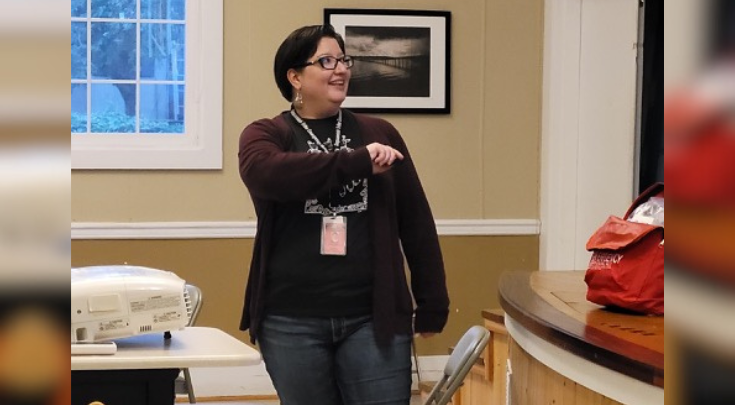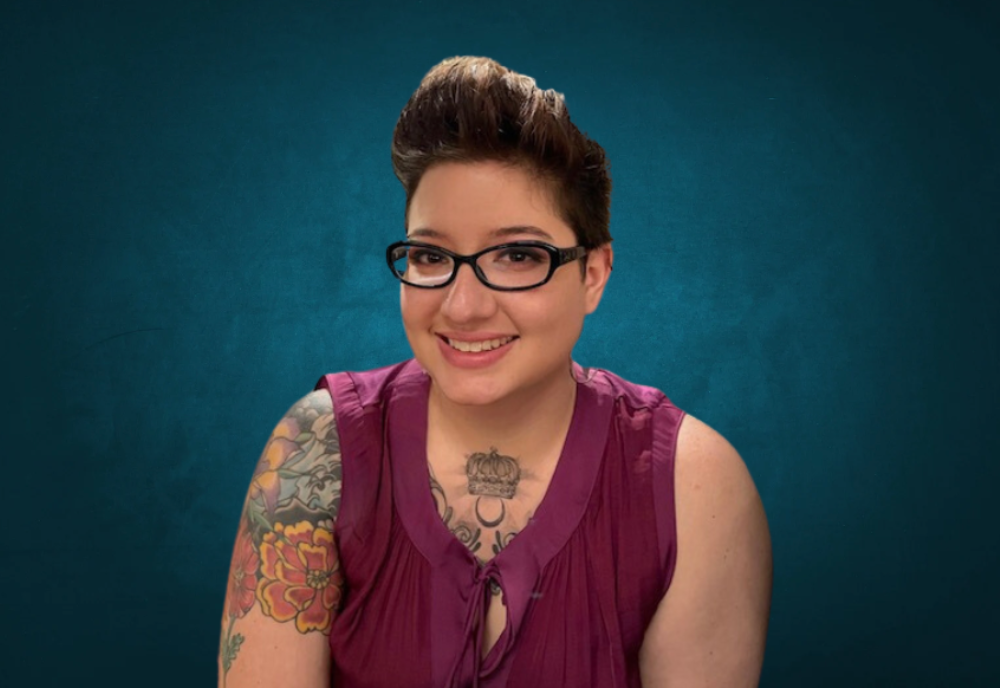Climate change forms a gamut of shifting patterns: a warming atmosphere, rising seas, more intense storms, flash flooding, forest fires, even migrating insects that affect crops. Depending on where you live, these variations can be negligible or dramatic − and in some cases, deadly − if people aren’t prepared.
A graduate student of USF’s College of Public Health (COPH), Sarah Henley has focused on the impact of climate change on certain at-risk populations of Native Americans who live in some of the country’s most remote places, and how these people can best prepare for challenging environmental changes in the near future.
Henley recently offered a talk at the NACCHO 360 conference in Detroit, the largest gathering of local health department leaders and public health professionals in the United States. During the conference, Henley shared her scholarly paper, “Climate Change and its Effects on Disaster Mitigation Planning for American Indian/ Alaskan Native Tribes: A Case Study Review.’’
Henley is outreach and volunteer coordinator for the Office of Emergency Management for the Suquamish Tribe and has accepted a new position at Tacoma Community College in Washington. She said that because of the close connection with the environment and the treaty rights that connect tribes to a specific place and resources, planning for climate change is becoming increasingly difficult. While many tribes have incorporated climate change mitigation into their emergency resilience plans, others are less prepared.
We caught up with Henley and asked about the challenges these people face, as well as her thoughts on climate change in general.

Sarah Henley teaches an emergency preparedness class in Indianola, WA called Be 2 Weeks Ready. (Picture courtesy of the Suquamish Tribe office of emergency Management)
What prompted you to become involved in this initiative?
First and foremost, I am a non-tribal person, this is important to note as I do not speak on behalf of a tribe, and I always encourage anyone to reach out to the Tribal government in their area. I grew up Italian in a multi-generational household with my grandparents, parents and sister in the Pacific Northwest.
I also grew up on the water, the Salish Sea. My love for the ocean and the environment, a constant in my life. There are 29 tribal nations in my home state of Washington, and I began working for the Suquamish Tribal government in the Office of Emergency Management. Although I grew up around Coast Salish tribal culture, I learned much more about the Suquamish Tribe once I began my work for the Tribe. I became curious about how tribes were affected by climate change and what kind of planning or mitigation efforts were happening within the community when I heard stories about climate change affecting the Suquamish Tribe. This curiosity drove my research.
Why is this important now and why do you think people should be concerned?
People should care about climate change and its effects on disaster mitigation planning for several important reasons, including, cultural preservation, vulnerability through historical marginalization, how tribal nations are disproportionally impacted by climate change, tribal sovereignty and self-determination, as well as a general global responsibility. The environmental impact to tribal traditional subsistence practices such as hunting, fishing, gathering and harvesting, is threatened by extreme weather events as well as recovery from the disasters.
Why is disaster mitigation important to these tribal communities?
Native communities have deep cultural ties to the land the natural resources. Preserving the heritage associated for current and future generations is essential for maintaining not only community identity but also tribal resilience. Many tribes rely economically on the harvest provided from the land. Whether through fishing, logging or other resources management. Mitigating disasters and protecting the biodiversity of the eco-system is crucial to the community and economic stability of the tribe and tribal community.
What challenges do you see in regard to climate change?
Climate change can increase or exacerbate health disparities that already exist in tribal communities. Climate change can worsen air and water quality, increase the prevalence of vector-borne diseases and intensify heat-related illnesses. Communities are often located in regions prone to extreme weather events such as wildfires, hurricanes, floods and droughts. Climate change is exacerbating the frequency and intensity of these events, placing communities at heightened risk.
Changing ecosystems, loss of biodiversity and altered weather patterns threaten traditional knowledge and practices that have sustained tribal communities for generations. This loss can undermine cultural resilience and identity. Many American Indian/Alaskan Native tribes rely on natural resources for subsistence, cultural practices and economic activities such as agriculture, fishing and hunting. Climate change-induced disruptions to ecosystems and natural resources can jeopardize these livelihoods.
Finally, many tribes face challenges in accessing financial resources, technical expertise and support for climate adaptation and mitigation efforts. This can hinder the ability to implement effective strategies and build resilience.
Does it concern you that so many policy makers deny climate change?
Yes. It’s concerning that many policy makers and politicians deny or downplay the reality and significance of climate change, a pressing global issue that requires urgent and concerted action to mitigate its impacts and adapt to its consequences. Denial or skepticism among policymakers can lead to delays in implementing necessary policies and measures to reduce greenhouse gas emissions, protect communities and transition to a sustainable economy.
You mention in your paper the risks to water supplies. Can you elaborate?
Climate change poses significant risks to water supplies for American Indian/Alaskan Native tribes, impacting both quantity and quality of water resources. Impacts may include loss of fresh water as sea water infiltrates freshwater aquifers, changes to agriculture due to altered precipitation, increased water temperature has altered fish populations and effected fishing and the economy that relies on it. Increased temperatures can also bring health implications such as limited access to safe drinking water or an increase in waterborne diseases.
Sea level rise also is critical. How will these communities be affected?
Sea level rise poses significant risks to many populations across the globe. River rise, melting permafrost and pack ice, as well as changes in coastal climates have led to increased flooding and loss of land. The issues of sea level rise range from loss of habitable land forcing the relocation of entire tribes. This relocation is expensive and disruptive to communities and usually includes the loss of traditional hunting and fishing grounds as well as important cultural sites. Relocation has caused in extreme cases legal and governance challenges.
What is the single most important recommendation you can make about this issue?
Anyone working or studying climate change or mitigation planning, please reach out to your local tribal government or village offices. Introduce yourself to the tribal leaders and elders. There is so much historical knowledge within the stories and tribal history. Be open minded and have a listening ear. The stories and knowledge of each tribe can explain timelines as well as impacts on tribal life, culture and climate.
